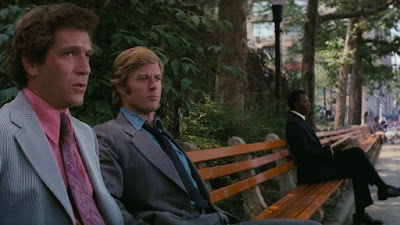The rock itself is the Sahara Stone, a precious jewel that belonged to Dr. Amusa’s (Moses Gunn) African nation until it was stolen during colonial times, and then stolen by other African nations, eventually winding up in the Brooklyn Museum. Wanting it back for his people, Amusa enlists Dortmunder and his brother-in-law Andy Kelp (George Segal) to steal it back for his people. All this is laid out in a scene establishing director Peter Yates’s wry approach. Amusa sits on a park bench but a good few feet over from Dortmunder and Kelp so as to talk without appearing to look as if they are talking. It’s not so much that eventually a woman plunks down on the bench between, putting a crimp on their covert chat, because that twist feels expected and Yates never transforms it into the belly laugh it should be, as it is Amusa giving a monologue on the meaning of the stone while staring straight ahead, as if he is talking to no one, this and Dortmunder and Andy only superficially listening, all taking the piss out of the mission’s inherent nobility. It goes to show how the best humor in “The Hot Rock” comes from figurative odd angles, where another movie might not think to look, like a later break-in at a police precinct to recover the stone which explosives expert Greenberg (Paul Sand) has hidden there after being nabbed that becomes less about the break-in itself than the oblivious police lieutenant who thinks he has put down a vigilante uprising.
This park bench sequence also sets up the movie’s crucial relationship between Dortmunder and Kelp. If the former is insulted by Amusa’s offer of financial compensation, he gets up and walks away, seen in long shot, while Kelp rushes after him and tries to talk him down, eventually returning to Amusa and re-negotiating. In a sense, Dortmunder is the talent and Kelp is his manager, trying to tip-toe the line between keeping his client happy and pleasing the guy for whom his client is working, all brought home in Segal’s ebullient voice, each subsequent setback just a chance to sell his operation that much more. “My guys thrive on challenge!” he exclaims in one scene, looking for all the world like the Hollywood producer Stanley Motts in “Wag the Dog” putting a happy face on a dumpster fire. In one scene, where the crew tries to thwart Greenberg’s father (Zero Mostel), who has his own designs on the stone, they really do go Hollywood, putting on a show in which the movie’s turn toward the frighteningly grave proves to be nothing one more than big got ya.
But that’s also part of the problem. This scene tip-toes up to the edge of serious only to pivot all the way away from it, epitomizing the whole movie, except that Redford is the kind of actor who is always serious. Indeed, if my first time watch a few years ago of the mostly somnambulant something-or-other “Legal Eagles” (1986) was good for anything, it was to put into perspective how, movie star aura aside, Robert Redford can’t do comedy. “The Hot Rock” provides further evidence. Scenes where his character is purportedly felled by a bad stomach never take humorous flight and in scenes opposite his sister, including one where he is briefly left in charge of her infant, fall flat. This is not even the worst part. Goldman’s screenplay writes Dortmund as someone with high regard for himself only to have that swelled head repeatedly cause him to bite off more than he and his crew can chew, but Redford just plays the part with a swelled head, meaning that he is playing exactly what the movie is trying to parody, emitting an odd sensation of a leading man who might as well be walking around the whole movie with a Kick Me sign stuck to his back.





No comments:
Post a Comment